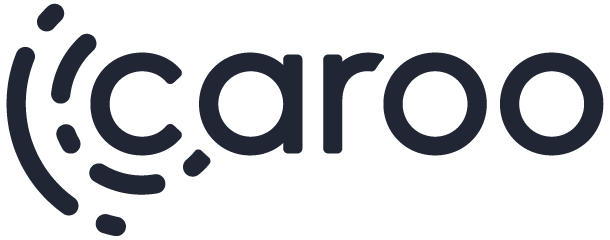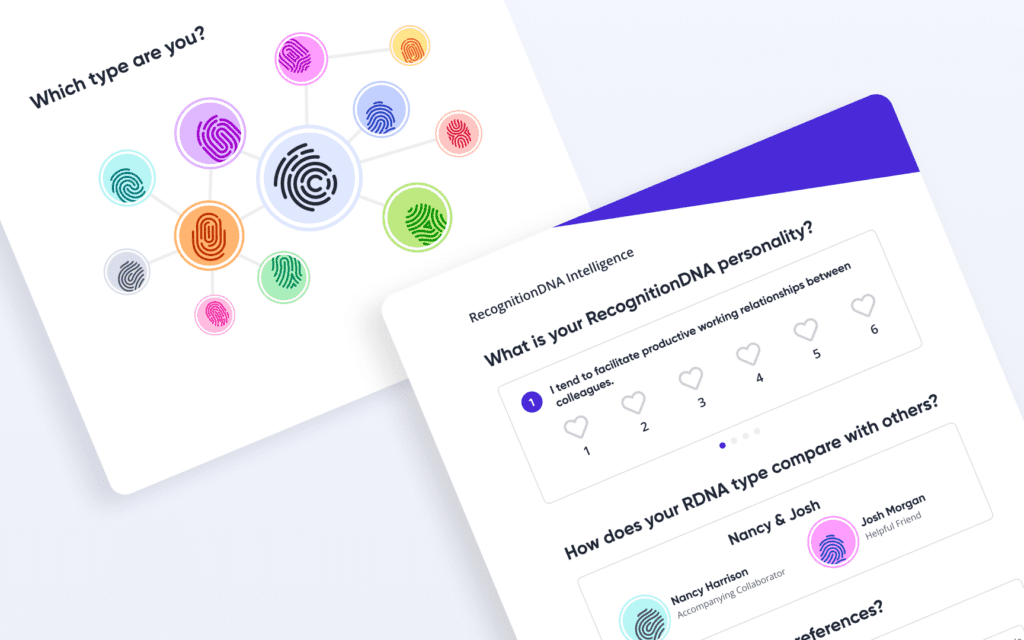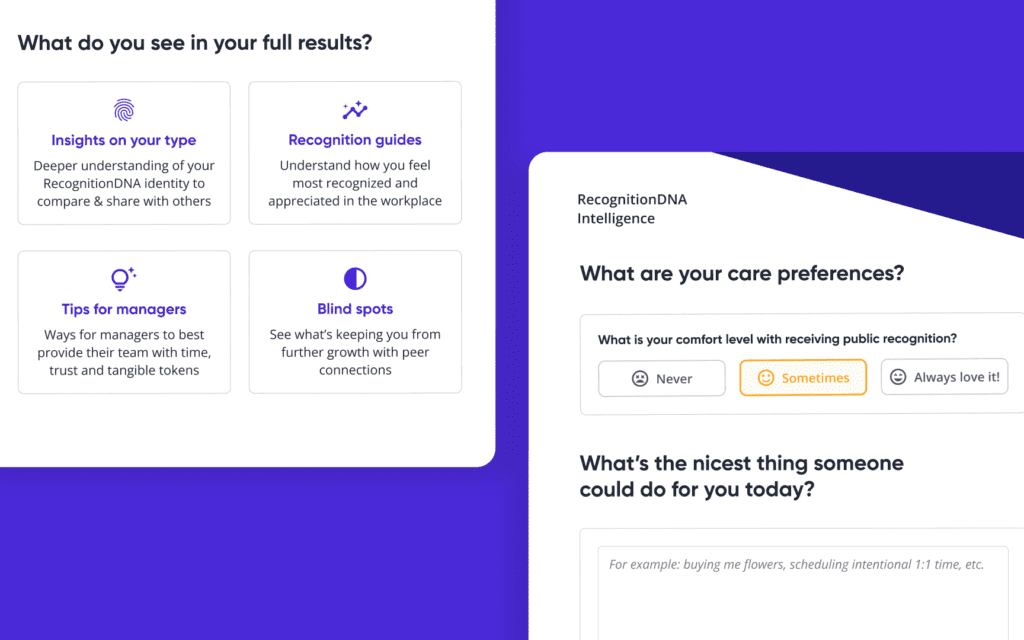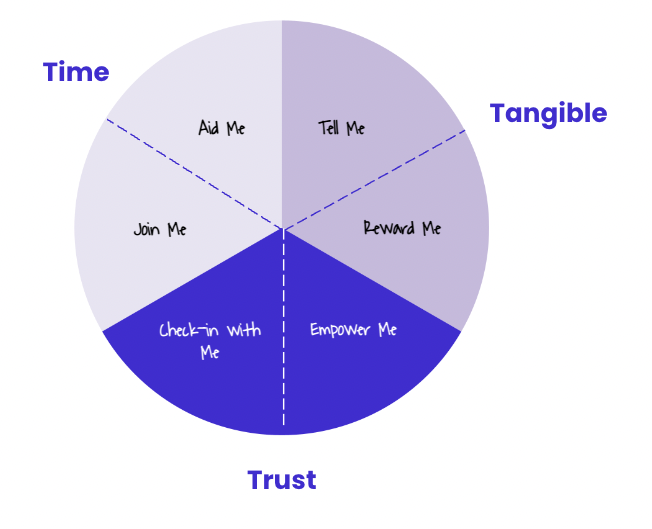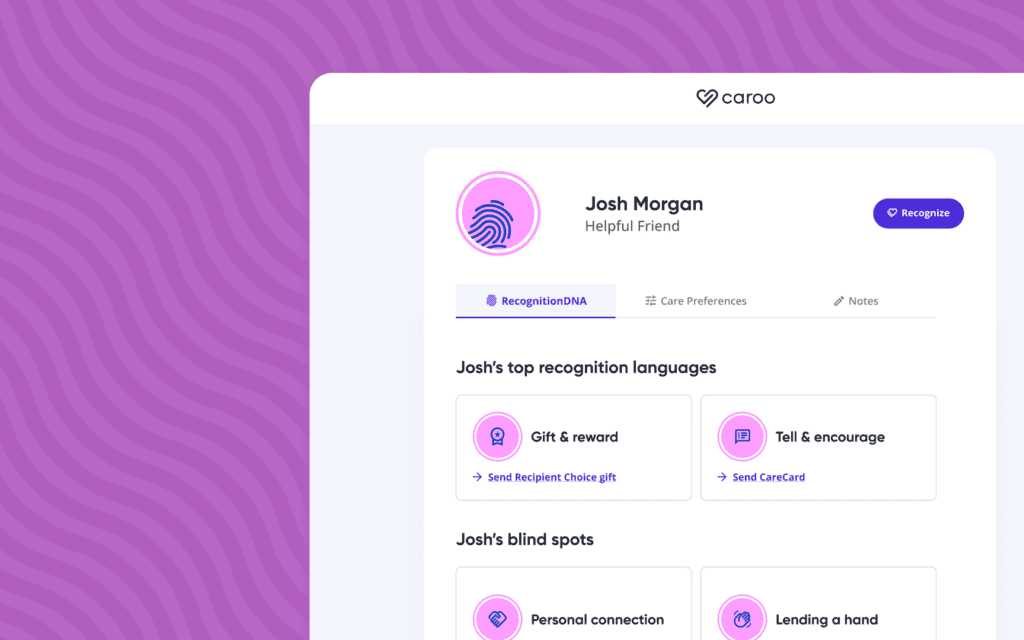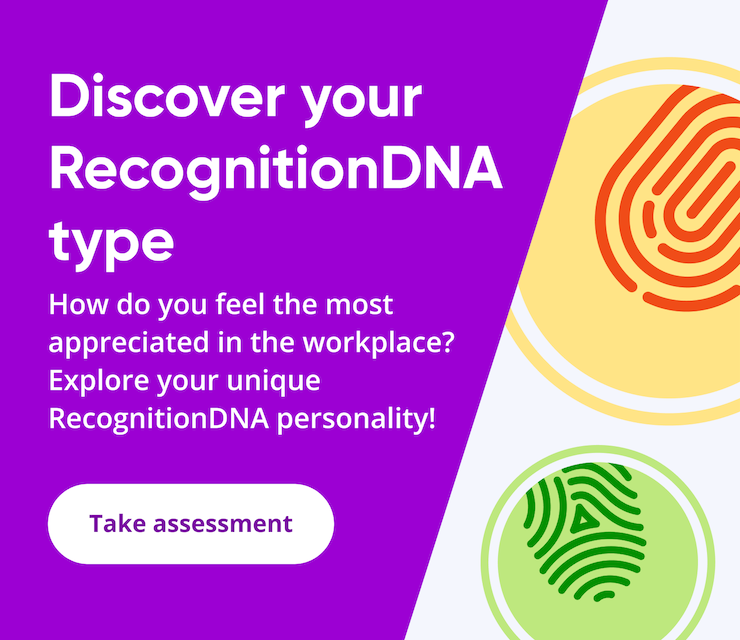For 2023, Forbes magazine predicts some pretty big expectations of HR professionals, stating that “HR will be tasked with ensuring the highest productivity from each person.”
This means getting higher quality output from the same employees. But how? How do you motivate employees to do more, produce more, report more, give more of themselves to their jobs?
Here’s a simple suggestion. Find out what makes them tick as an individual!
Since 1992, Gary Chapman has been teaching us how to identify and understand the different ways that people feel loved with The 5 Love Languages. A simple assessment reveals the language that most authentically resonates with each person. And by learning to “speak” our partner’s primary love language, we’re able to create stronger relationships, understand one another on a deeper level, and communicate clearer.
RecognitionDNA is intended to determine our love language when it comes to recognition in the workplace.
Removing the romantic context of course, each individual feels appreciated by different methods and gestures.
For example, some people love receiving gifts and a thoughtfully-worded card from their leadership to show how much they’re valued, while others are more deeply moved by having their accomplishments announced loudly and proudly so everyone can see and congratulate them.
If you gave the latter a card and a gift, they’re not going to feel acknowledged in the same way because that’s not in their RecognitionDNA.
This is what makes them tick.
Recognition tactics can be a recipe for disaster when you don’t know how to reach your employees. Typically, this is where companies start throwing money at the situation. They create focus groups, send out a few cryptic and ineffective surveys, and make major investments into things they think will “fix” the issues, without even digging into the data first.
Why is this often a big mistake?
Because the details are always in the data. DNA data, to be more precise.
So, let’s close the capital checkbook for just a minute and do a deep dive into how assessing your employees’ RecognitionDNA can be a fun, flexible, and feasible guide towards more effective recognition for your workforce.
What is RecognitionDNA?
RecognitionDNA is a psychological assessment that helps to clearly identify how each individual interprets and receives recognition.
The idea that everyone feels appreciated by the same forms of recognition is no longer a one-size-fits-all cookie-cutter process.
At its core, RecognitionDNA is a powerful tool for creating a more authentically engaged and connected workforce. It’s intended to nourish your employee base from the inside out and support a people-centered work environment.
RecognitionDNA is built upon three distinct aspects of recognition:
1) Time
Steve Jobs said “The most precious resource we all have is time.” And time itself is a form of recognition. Some employees most value time spent reviewing their projects, connecting to resources they need to be successful, discussing their work-life balance, and receiving feedback on their progress.
2) Tangible
Receiving gifts is a love language that’s not just reserved for romance. Material gifts and rewards are received in much the same way, with very similar effects on the receiver. Tangible recognition is basically anything they can use or physically touch – gift cards, a spa day, or a monthly wine subscription can really hit the target.
3) Trust
Showing your employees that you trust them to deliver is a subtle yet impactful form of recognition. Offering them support on–tap, with a side of autonomy to reach their goals without hovering, is the most empowering recognition you could offer this group. Acknowledging their dependability and consistency is like motivational currency.
How long does it take to discover your RecognitionDNA results?
Minutes. No joke!
The RecognitionDNA assessment isn’t a clunky time sucker at all.
It’s super easy to navigate and delivers a ton of valuable information in an impressively short amount of time.
Recognition: Achievement vs. Relationships
Some professionals are motivated by progress and achievement, while others are motivated by their relationships with their peers. And neither is wrong or less inspired than the other – they’re just different sides of the same coin.
► Achievement
These task-oriented folks keep their eyes open for the gaps and opportunities, while never losing sight of the deadlines. They value regular check-ins to review progress because their work is important to them and they’re proud of their efforts.
They also appreciate positive reinforcement and encouragement from those in leadership.
► Relationships
Their work is equally important as the Achievement group, but those on this side of the coin appreciate when others acknowledge them as a person too. Work is only a piece of who they are and they’re more engaged by questions like “How are you feeling?” and “How’s the new puppy fitting in?” They’re motivated by opportunities where their leadership expressly believes in them and empowers them to push beyond their own limitations.
Recognition DNA Personality Types
 Collaborator
Collaborator
Collaborators are some of the best team-builders in the business. They’re true-blue team players who find deep satisfaction in bringing people with unique skill sets together and winning as a group.
How this personality type relates to employee recognition: The Collaborators don’t want to beat you, they want to join you. Setting time aside to have a brainstorming sesh or even grabbing lunch with them are a couple of simple ways to resonate most effectively with this type.
 Companion
Companion
Authentic and organic interactions feed the Companion’s motivation and they too thrive in group settings. Their engagement style is geared toward building community and supporting a positive environment for its “residents.”
How this personality type relates to employee recognition: Feeling like they’re part of something bigger is a major motivator for Companions. An inclusive environment allows them to feed off the collaborative energies of others while generously applying their valuable expertise to support the bigger goals.
 Helper
Helper
The title says it all. These superhero sidekicks have no problem asking “How can I help you?” Helpers are the load-lifters who repeatedly step up to support their colleagues by relieving any sense of overwhelm they can.
How this personality type relates to employee recognition: Helpers notice when people are intentionally appreciative of the things they do to help others. They don’t do these things specifically for the anticipated praise, but they’re definitely impacted and encouraged when they receive it.
 Uplifter
Uplifter
Remember when Oprah gave everyone a car? Disclaimer – we can’t say for sure that Oprah is an Uplifter, but certain people just genuinely want to see everyone win. They value balance and a sense of calm and purpose across their personal and professional lives.
How this personality type relates to employee recognition: If you’re looking to uplift the Uplifters, their recognition language is a medley of flexibility, peace, and wellness. Benefits like a generous PTO bank and flexible work schedule deeply resonate with this type.
 Commemorator
Commemorator
Your goal-oriented overachievers likely fall into this category. They’re intensely driven by deadlines and may be known to go above and beyond more often than not. Any expectations set for them are just a baseline because they know they can do better.
How this personality type relates to employee recognition: Match their effort in your recognition. Tangible gifts are certainly a fan favorite and expressed encouragement of their efforts really fuel their fire.
 Giver
Giver
You’ve probably heard the term “we can’t pour from an empty cup” and your Givers need those refills in the form of authentic recognition. They take the time and energy to learn about their colleagues in order to better relate as people, and those efforts must be acknowledged.
How this personality type relates to employee recognition: Connecting their recognition to a specific date or occasion is deeply personal and hits a little different. Be sure it’s truly personal to them and consider this – Givers actually read your cards hoping to feel genuinely seen through your words.
 Affirmer
Affirmer
Consistent and positive reinforcement is highly valued by this type. Affirmers prefer that you use your words to support their goals and celebrate their accomplishments over any other form of recognition. Their confidence and motivation are fed from the affirming words of their colleagues and managers.
How this personality type relates to employee recognition: In correlation to the 5 Love Languages, Affirmers need words of affirmation to feel truly recognized. They like to hear (or read) their recognition and they value confirmation from their teammates and direct leadership that they’re good at what they do.
 Encourager
Encourager
This type doesn’t just need encouragement related to their professional aspirations, but also in regard to who they are and what their “ness” adds to the team. Making a favorable impact on their colleagues and their environment means a lot and they strive to be a positive force in the group.
How this personality type relates to employee recognition: Simply taking a few minutes to tell the Encouragers how much you appreciate specific moves they’ve made is like music to their ears. They value knowing why their contributions matter to those around them.
 Motivator
Motivator
Some employees just want to be seen. Motivators don’t really need the fanfare but they do need to know their work is valued and they’re supported by their leaders.
How this personality type relates to employee recognition: Candid conversations that include a pulse check on their progress keep the Motivators… well… motivated! Regularly touching base with these employees to ensure they have all the resources they need fuels their commitment to their role and their leadership.
 Friend
Friend
There’s no “work persona” and “home persona” for the Friends. They’re authentically themselves as often as possible and thrive in an environment where that’s not only reciprocated, but also encouraged.
How this personality type relates to employee recognition: The best way to impact this type is to share with them. Share information, gratitude, feedback, plans, and most importantly – share some time with them on a regular basis.
 Advocate
Advocate
Those employees who set the bar higher for themselves than you do for them are likely your Advocates. They’re highly motivated by opportunity and autonomy and they work best under leaders who understand that micromanaging isn’t a healthy option.
How this personality type relates to employee recognition: Reinforcing your trust and faith in them is the most powerful language. Advocates shine brightest in an environment where they’re notably encouraged and recognized for their achievements but their peers and management.
 Coach
Coach
Character is at the core of the Coaches and shows up in the ways they lead their teams. They make each “player” feel like a valued individual, while showing them how important they are to the bigger team picture.
How this personality type relates to employee recognition: Pushing them outside their comfort zone is a great way to show the Coaches you see their bigger potential. Trusting them to effectively lead their teams will only produce more and more motivation.
How can RecognitionDNA be used by managers & team leaders?
1) You can achieve a better understanding of how you approach recognition
Identifying where you are versus where you want to be starts with RecognitionDNA. Understanding how you’re currently handling recognition in your workforce offers a solid baseline to start improving and gives you better clarity on what’s not working.
2) You can achieve a better understanding of how your employees approach recognition
Each employee has a recognition language just like each person has a love language. Speaking to them in any other dialect is like trying to have a conversation in Italian when you’re the only one who knows the language. Epic communication failure. But assessing their specific language with RecognitionDNA ensures a clear exchange of appreciation with each individual.
3) Access recognition guides to learn how different types of recognition impact your team
Learning your employees’ various recognition languages doesn’t mean you’ll instantly know how to speak each one. You don’t open the first Rosetta Stone module and suddenly find you’re fluent in Mandarin, right? Using an employee recognition preference questionnaire like RecognitionDNA guides you through learning each new language and ensures you’re putting the right emPHAsis on the right syLLAble.
4) Locate potential blind spots in your recognition program
You don’t know what you don’t know. But what we do know is that what you don’t know can hurt you. These are your blind spots. RecognitionDNA identifies these weaknesses (aka opportunities for improvement), which helps to avoid any hiccups or pitfalls in your recognition program moving forward. It also allows you to ask the right employee recognition survey questions when it comes time to evaluate your existing program to find ways to improve it.
5) Learn ways to improve your recognition program
It’s funny how identifying what’s not working sets you on a clearer path to what will work. Recognition DNA helps you to understand how your recognition program is not authentically serving your business or your employees. Once that’s clear, it’s so much easier to redesign the program to ensure a more sustainable and successful plan that showcases the benefits to employee recognition.
Pain Points
Not knowing why your recognition program isn’t effective is all the motivation you should need to start digging deeper. But certainly there are other pain points in your recognition process that may fall into your blind spots. RecognitionDNA shines a spotlight on your gaps and helps to bridge them with a more individualized approach.
Conclusion
Remote employees may have more flexibility in their schedule but they’re are at risk too. Even working from home can lead to stagnation and burnout.
Employees may feel disconnected, disengaged, and disappointed. They don’t have the same level of interaction with their management and peers that they once did, and can often feel uninformed and undervalued. There’s no bosses walking by their desk anymore asking about their new project or congratulating them for landing a big client. They don’t feel recognized for all the time they invest, even if it’s from the comfort of their couch.
There’s a stale and underserving expectation circling the drain that the world will eventually return to the way it was pre-pandemic. That once again, desks will be manned by humans and the parking lots will be full of commuters.
Meanwhile – here in the real world – more and more companies are actually reconfiguring their onboarding processes and developing more flexible work policies. They recognize that remote work options are here to stay so it’s better to be prepared now than to get caught up in the riptide beneath the wave later.
Learning more and more about the different ways employees value recognition can help you start to build up your list of employee recognition best practices to follow. This will ensure your recognition program is more effective while still flexible enough to make improvements. Recognition is always going to remain a very important aspect of the workplace, so it is important to find the best ways to say thank you to your employees and not try to standardize the entire process.
RecognitionDNA Assessment: Frequently Asked Questions
Q: Where can you take the RecognitionDNA assessment?
- A: You can take the RecognitionDNA assessment at this handy dandy link. And don’t hesitate to share the link with your entire workforce. The assessment isn’t tedious or time-consuming and can genuinely benefit your company culture as a whole.
Q: How can you use RecognitionDNA to take the next steps?
- A: RecognitionDNA can be used to take the next steps toward providing authentic recognition that truly resonates with your employees and colleagues. Honing in on how each person feels valued gives you better insight into how to design and maintain a people-first culture.
Q: Can everyone on your team participate in RecognitionDNA?
- A: Everyone on your team can absolutely participate in RecognitionDNA. In fact, we highly recommend that you share the link with all of your employees so you can create a recognition profile for each individual as opposed to the collective opinion.
Take the assessment and see for yourself how smooth and simple it is. Then send it out in a company-wide email blast so all your employees can get their RecognitionDNA on file and you can start changing the recognition game.
